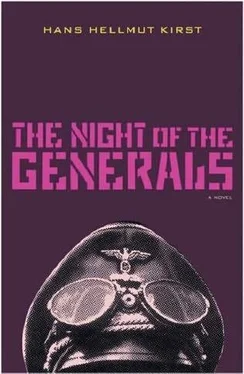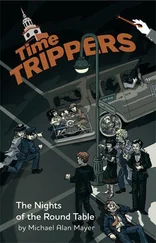“I wouldn’t put anything past you,” said Kahlenberge.
“Very wise of you!” Prévert replied, motioning him to follow.
A man in a smart grey suit silently took charge of Kahlenberge’s luggage and led the way through the swing doors. They emerged on to the pavement, where a large dark saloon stood waiting by the kerb—a Renault with a Berlin number-plate.
They got in. Prévert raised his hand and the car drove off towards the centre of the city.
“Don’t worry,” Prévert remarked. “You won’t miss your lecture. Have you got it taped yet?”
“Not quite.”
“Never mind,” Prévert said equably. “I may spare you enough time to correct a point here and there.”
“So it wasn’t a coincidence,” Kahlenberge did his best to look amused. “You obviously suffer from the same old vice-moving people around like pawns on a board.”
“Just take a look at this city,” said Prévert. “Don’t you feel it bubbling away just beneath the surface? Berlin always reminds me of a gigantic barrel full of fermenting wine—if you’ll pardon the analogy. I’m still fond of my drink.”
They drew up outside the Dollhagen, the celebrated delicatessen shop in the Kurfürstendamm. The driver opened the door, still without a word, and Prévert and Kahlenberge got out. People streamed by without giving them a second look. Kahlenberge revelled in the sense of anonymity. He enjoyed being just another face in the Berlin crowd because it made him feel he belonged.
“Let’s fortify ourselves a little first,” Prévert suggested. “I’m sure you could do with a bite and it won’t do me any harm either.”
They climbed the stairs to the first-floor restaurant, where a table had been reserved for them beside a window in the far corner. The head waiter bowed and smiled. All Prévert had to do was to raise his hand like a president unleashing the waters of a dam, and two plates of baked oysters appeared, bedded in red cabbage and accompanied by a bottle of Chablis ’53.
“Almost like being in France,” said Kahlenberge.
Prévert nodded. While they ate he expatiated smilingly on an acquaintanceship with culinary refinements. If ever a nation took it into its head to make war on France for that reason—but only for that reason—he, Prévert, might be able to sympathize with its motives.
“Well, I feel twice the man,” Kahlenberge sighed, when nothing remained but a litter of shells and two squeezed lemons. “You can come to the point now.”
“With pleasure,” said Prévert, dividing the rest of the Chablis equally between their two glasses. “What I have to tell you can be summed up in a few words. We haven’t seen each other too often in recent years, as you know, but we’ve been admirable correspondents. You know that last letter of yours—the one I got a few days ago? There was one sentence in it which made me sit up.”
“There wasn’t anything special about it, as far as I can remember.”
“The sentence I’m referring to,” said Prévert, “ran something like this: ‘Even General Tanz seems to recognize the signs of the times. They say he’d like nothing better than to make contact with the West.’”
Kahlenberge wagged his hairless, glistening head, which looked more like a billiard ball than ever. “I don’t see anything unusual in the fact that one man has lost his taste for life in East Germany. Millions share his opinion. Nothing could be more natural.”
“On the contrary,” said Prévert firmly. “I can’t imagine anything more unnatural—in Tanz’s case.”
BRIEF NOTE: Tanz in the intervening years Promoted to Corps Commander at the end of July 1944, after the successful quelling of the revolt in the Paris area. Transferred to the Eastern Front in this capacity and fights first in Silesia, then in Brandenburg. Taken prisoner by the Red Army.
1945-49, prominent inmate of a camp for generals near Moscow.
1949-51, confidential adviser to the Russian Army of Occupation in the Saxony-Thuringia area.
From 1952 onwards involved in the creation of the so-called National People’s Army of the so-called German Democratic Republic.
Since 1955, frequently tipped as a potential Deputy Minister of Defence in the same political set-up.
“What’s so worrying about it?” asked Kahlenberge, smiling at Prévert with a hint of curiosity. “What do you deduce from it?”
“Certain things,” Prévert said. “I’ve got my fair share of imagination, you know. It can be awkward sometimes, for other people as well as myself.”
They emptied their glasses, ordered another bottle and waited in silence until the wine waiter had finished serving them. While he did so they stared out at the Kurfürstendamm with apparent interest, each man covertly eyeing the other’s reflection in the polished glass of the window. They smiled as their eyes met.
“If I understand you correctly,” said Kahlenberge, leaning forward, “I owe my invitation to Berlin to you.”
“Shall we say—I arranged it.”
“May I ask what your motives were?”
“I had several, mon cher. In the first place, it seemed a good opportunity to see you again after all this time, and, in the second place, I felt I might be able to offer you an entertaining experience. In fact, I may be able to lay on a performance which you would not have missed for worlds. But that’s not all. I may well need your assistance.”
Kahlenberge smiled wryly as the last words sank in. “I expected something of the sort,” he commented. “You plan to use me as a sort of bait—for Tanz, of all people. I suppose I oughtn’t to be surprised.”
“The idea annoys you?”
“Put your cards on the table, Prévert. What do you want with Tanz?”
“Can’t you guess?”
“I imagine you want to win him over. For some reason, you want to lure the revered General Tanz into the Western camp—with my help. On the other hand, you may be doing a little wild-game hunting and you need me to help beat the covers.”
“You could be right.”
“I’m shocked at you,” said Kahlenberge, “shocked at what you’ve turned into. You treat yesterday’s enemies like old friends. Next, you’ll be telling me there were no Nazis, only Germans. Go ahead, then—scrub out three wars and call history a whore. Let’s all indulge in an orgy of spurious bonhomie.”
“I could argue that it’s the trend of the times.”
“And I could tell you to take your trend of the times and go to the devil!”
“Thank you for those few kind words,” said Prévert with unabashed amusement.
He raised his glass to Kahlenberge, small eyes sparkling like greenish water lit by a ray of sunshine. Then he put his glass down and rubbed his hands together as though he had concluded a particularly advantageous business deal.
“Do you remember the strange yarn Hartmann told us on the way south from Paris?”
“Morbid nonsense!” declared Kahlenberge. “The product of an over-heated imagination. You thought so, too, didn’t you?”
“What he told us certainly sounded morbid, but I’m beginning to wonder if it was such nonsense.”
“Really, Prévert! You were sceptical enough about his story yourself—to put it mildly.”
“Yes, I was,” Prévert conceded, “then.”
“But not now?” Kahlenberge shook his head wonderingly. “My dear chap, it’s absurd—absolutely crazy!”
“A lot of things are absurd and crazy, war most of all. The more I think about it, the more convinced I become of one thing: there’s nothing a human being isn’t capable of, especially when war has destroyed all his inhibitions. The question of rank doesn’t enter into it.”
“It’s all very well theorizing, but don’t forget that the boy was in a state of nerves at the time. He was at the end of his tether.”
Читать дальше












